Star Trek: Discovery wrapped its second season last night with an as-advertised ‘game changing’ jump to the far future, leaving Captain Pike, the Enterprise, and everyone else the from the last two years behind.
Helping to set the course for the show’s new future is series writer Michelle Paradise, who joined the Discovery team in the early part of Season 2, and is already making waves on the series as she steps up to join executive producer Alex Kurtzman as co-showrunner for the in-development Season 3, expected to arrive for viewers sometime next year.
After penning the Airiam-centric “Project Daedulus” earlier in the season, Paradise teamed up with Kurtzman co-writer Jenny Lumet to bring this year’s Discovery story to a close in the two-part “Such Sweet Sorrow” — and we caught up with her this week to talk about wrapping up Spock, those Borg parallels, Admiral Cornwell’s fate, and a whole lot more.

TREKCORE: Before we dive into the finale, could you talk a little bit about the journey that brought you to the Star Trek: Discovery team this season?
MICHELLE PARADISE: Well, I had been on The Originals for five seasons prior to this — I had done other shows before that, but I was on The Originals from day one to when that show finished up. Then I heard about this opportunity on Star Trek, which was such an amazing — I mean, what an amazing thing because I grew up watching Star Trek and to have an opportunity to write for the show was just incredible.
I came in, and I interviewed, and I got the job, which was wonderful. So I joined halfway through Season 2 and I’ve been working quite a lot with [executive producer and showrunner] Alex Kurtzman. I was working on some of the other episodes in addition to “Project Daedalus,” and then he asked me to write the finale with him and Jenny [Lumet], which was also just such an amazing experience.
We just get along really well and work very well together — and then he asked me to [be co-showrunner for Season 3]. I mean it’s the biggest no-brainer in the history of the world!
TREKCORE: Was it difficult to jump in to Discovery mid-stream, with how much of this year’s story was such a big puzzle?
PARADISE: You know it’s interesting — quite a few things, in terms of the larger mythology, were already set in motion by the time I arrived. They already had a handful of scripts by the time I came in, and some outlines [for later episodes], so they were definitely on a path.
But what was great is that there were still some larger decisions that were still being figured out — and there was a lot of the story yet to be told. Like, when I came in, Spock hadn’t even been introduced yet. We knew he was coming [later in the season] but the character itself hadn’t been introduced… so there were still quite a few larger questions to explore at that point.
Once I got up to speed on where they were [with the story], and where they wanted to go by the end of the season, I felt like I slotted in pretty quickly. And, of course, I was familiar with Season 1, so I know all of the characters, and what experiences they had had.
Being able to take all of that information and jumping into apply it to Season 2 was a really enjoyable and fun thing for me to do.
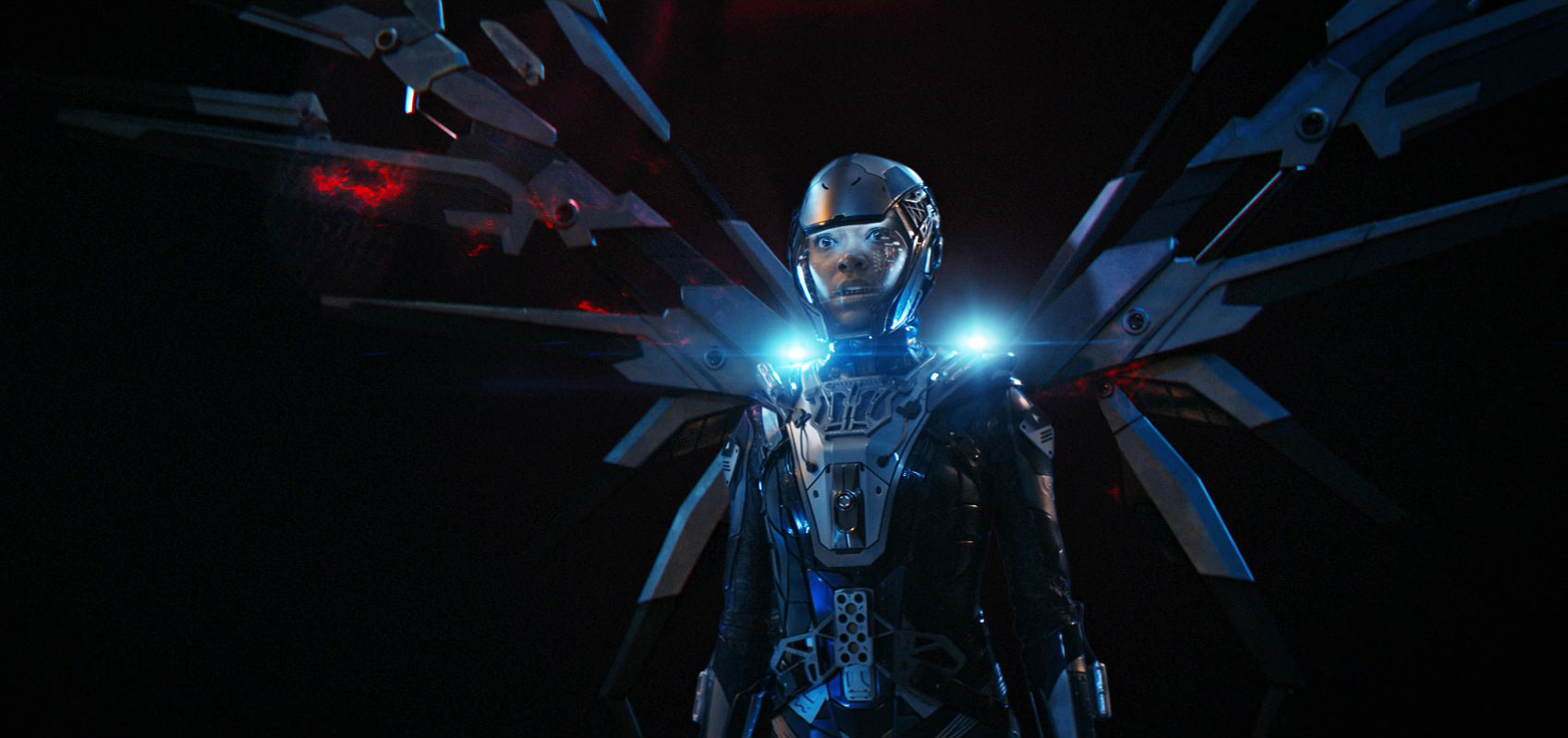
TREKCORE: Speaking of larger questions, the big mystery of the season gets answered in the finale, in that we find Burnham actually created the Red Signals to form the coalition to fight Control. How much of that final outcome was locked down at the beginning of the year, and how much came together as the episodes progressed?
PARADISE: I think it was an evolution of things — it was known from the beginning that we were going to a place where the Discovery was going to need to jump into the future.
In terms of the signals and the Red Angel, we knew that we needed to resolve all of that, what those things were specifically and how they would land, but some of that road map was still being worked out at the time I came on board.
It was really exciting to be a part of those discussions, because sometimes when you come into a show mid-season, a lot of things are already kind of set in place, and there was a lot that was already answered when I joined, but to get to be part of some of those larger discussions was really cool — because I got to the end of the season and I did feel like I had missed out on participating.
TREKCORE: Let’s get into the episode itself — Control finally gets taken down after that long fight with Georgiou and Nhan. How did you decide that magnetism, a rather low-tech solution, would be the key to stopping the advanced AI?
PARADISE: Well, by this point in the story — and we had set this up in “Through the Valley of Shadows” — the Control nanobots were known to be highly advanced, but they were still made from a metallic alloy; Spock is able to magnetize the floor on the Section 31 ship to stop the nanobots when Burnham is trying to get away from them.
We talked about how Control could essentially infect and inhabit a human form, and how the nanobots would do that — and it really just a matter of deciding what they would be made of, and how we could defeat it. So we wanted to use the thing it was made of against itself, the metal material.
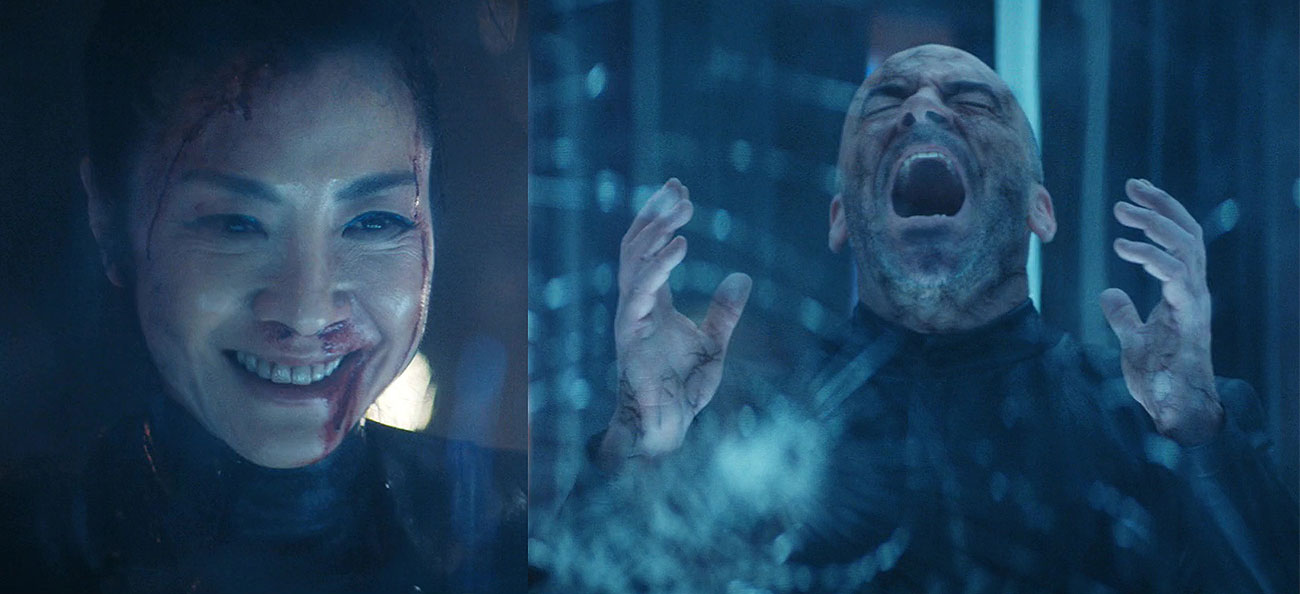
TREKCORE: And it certainly gives Georgiou a hero moment for the season, after being such a villain last year…
PARADISE: Yeah, and I just have to say that the moment [where Leland is defeated], Michelle [Yeoh] just plays that character so beautifully. The moment where she’s watching him die, and she just smiled… I never cease to be delighted by that moment.
TREKCORE: As Control evolved throughout the season, some viewers started to see some similarities to one of Star Trek‘s biggest villains, the Borg; there was a lot of speculation that we were actually seeing how the Borg were created, though obviously that didn’t come to pass. Was that intentional parallel?
PARADISE: It’s interesting — we weren’t thinking Borg at all. I mean, we talked about all sorts of different things in the room, but there was never any intent on our part to parallel that in any way. I can certainly understand why people started to think we were going in that direction, but it was never where we intended to go with it.
TREKCORE: Stepping back a bit to that big three-way fight with Leland, Georgiou, and Nhan, that special rotating set to simulate the gravity failure…
PARADISE: We had lots of discussion about that rotating set – I’m very familiar with it! I missed when they were filming on that by one or two days [when I visited the sets]… they would have never let me do this, but I really wanted to go in and try it out!
We built that section of the corridor as a massive, rotating set, so you are actually seeing the actors walk up walls and ceilings as the set is rotating around them — it was just an incredible engineering and construction feat. If I remember correctly, I think that was [director Olatunde Osunsanmi’s] brainstorm. It was such an amazing idea, we couldn’t not do it. It was incredible.

TREKCORE: It’s really impressive to see something of that scale being done for television. Obviously, Discovery has a significant production budget but it’s something that generally would be done with wirework and greenscreen…
PARADISE: It really is exciting — and that kind of vision and scope, Alex drives that for the series, for every episode. His feeling, and all of ours, is that we want to blur the line between film and television. He really is a visionary in that way, encouraging us all to think like that — and to me, this finale is a perfect example.
From the rotating set to the incredible amount of visual effects in the episode — Jason Zimmerman and our VFX crew, our entire post crew and sound mixers… everybody comes together and makes that happen. Movie-quality and movie-style post work on a television schedule. That’s true of the directing, the acting… the fact that [Olatunde] accomplished what he did in this finale, on a television schedule, is amazing.
TREKCORE: Speaking of that scheduling, “Such Sweet Sorrow” was originally planned to be a one-hour finale — what lead to the decision to break it into to episodes, and expand the story?
PARADISE: We got to the end of the season, and as we were breaking the finale, we realized that to do the story justice, to do the characters justice, to answer all of the questions… it required a large story, and that just wasn’t one episode. We’re so thankful that our network partners heard that and gave us the opportunity to do it in two, because if we had tried to tell all of that in one episode, we really felt like a lot would have been left out.
We would have had to make the kinds of sacrifices that we didn’t want to make — and while the season was building to an epic finale, it wasn’t just in terms of fight sequences and battles, but an epic emotional moments too. We had to pay off the Burnham and Spock relationship, which deserved the time it got.
Plus, our bridge crew, and Captain Pike — a huge addition to the season, along with getting to see the Enterprise in all its glory… paying off that character, and all of the moments in between, we really needed the second episode. And we were very fortunate to have been given that opportunity.
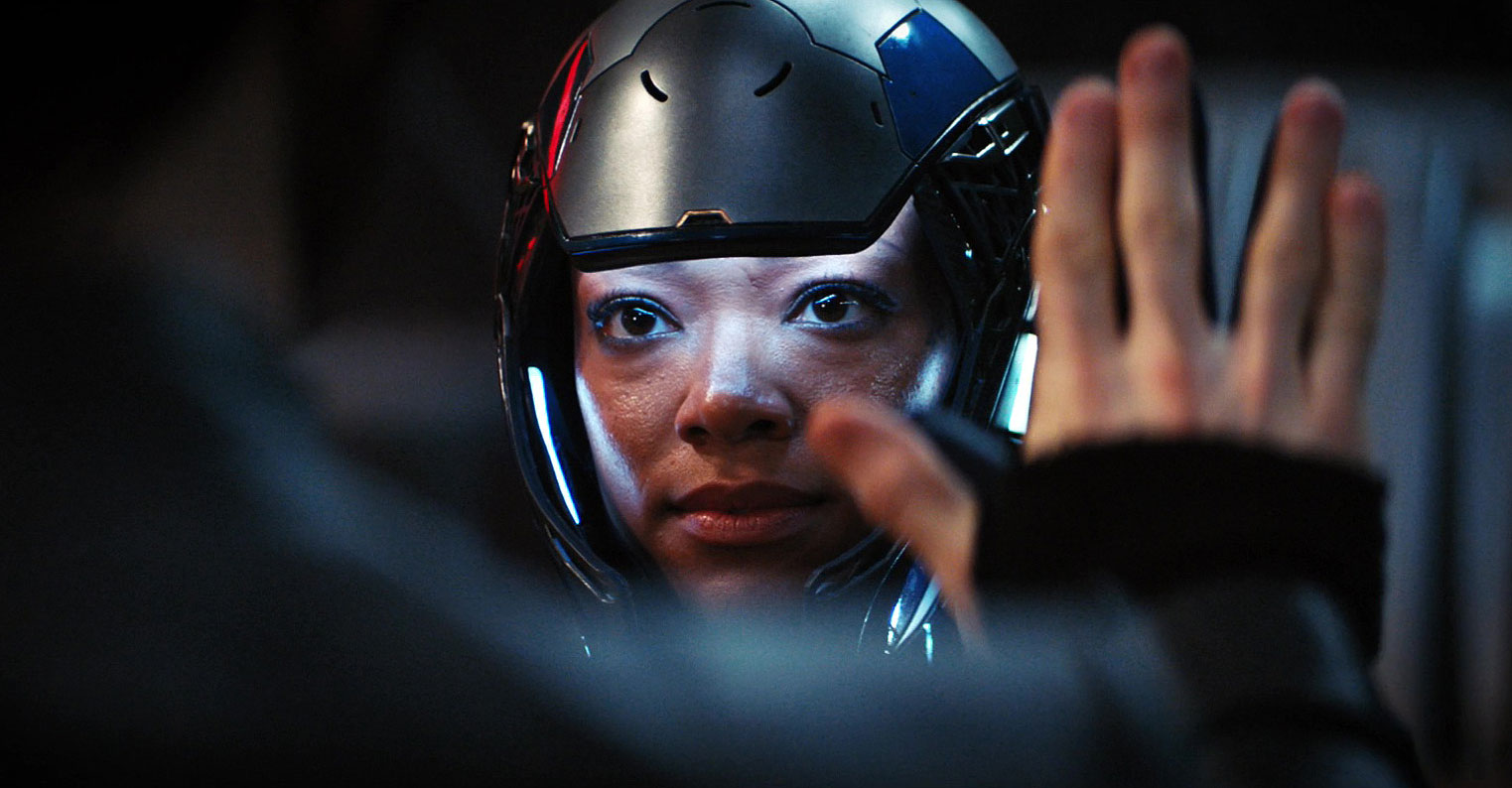
TREKCORE: Before we get to the big ending, let’s do a bit of a character lighting round.
PARADISE: Yeah, sure!
TREKCORE: I have to ask, did Nhan survive that fight with Leland? The last time we saw her was face-down in the corridor…
PARADISE: Well I can’t say anything about that, but I will say that Rachael [Ancheril] is incredible. She pops in a big way, and the work that she did in the finale was absolutely wonderful. Even just watching as a fan, I loved watching her and Georgiou together, and the whole battle with Leland leading up to the rotating corridor was fantastic.
She’s been a wonderful addition — you know, she had a huge role in “Through the Valley of Shadows,” and other great moments along the way, so I’m not surprised that people have responded to her so well.
TREKCORE: You can really tell that she’s just having fun being there, which really comes across.
PARADISE: Oh yeah — and I have to say that all of our actors are like that; they’re all so supportive of one another and they really seem to enjoy being there and encouraging one another. It’s a great group of people.
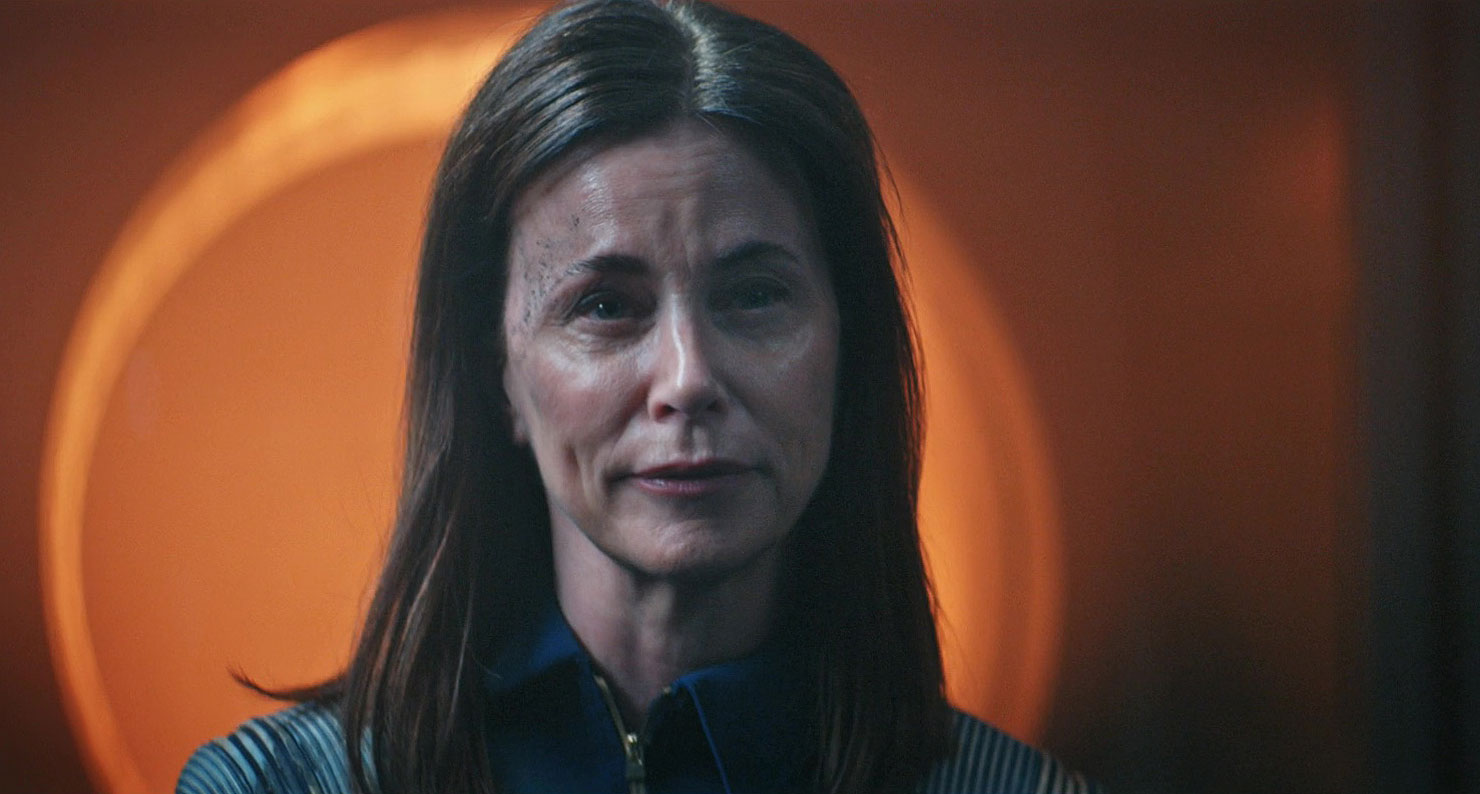
TREKCORE: Well, the one character we do know the fate of is Jayne Brook’s Admiral Cornwell, who sacrificed herself to save the Enterprise. What lead to the decision to end her story?
PARADISE: It was a really difficult decision, but the thing we talked about is that you can only really tell the strength of an adversary by how they impact your heroes. As Control was getting stronger and becoming a more formidable foe, we thought about how that would impact the Discovery crew — and you saw the first casualty back in [“Project Daedalus”] with Airiam.
Once that happened, and the crew lost someone who was close to them, it put in relief how much more powerful this thing was than they expected — and to have this big battle [in the finale] and have no one die, it didn’t feel realistic.
It’s one thing to see characters that we don’t know or that we’re not familiar with lose their lives, but the real measure of how difficult the battle is — how much danger we’re in, how strong our opponent is — is if we lose someone close to us. We talked about who that might be, and we couldn’t think of a more appropriate person than Cornwell to step up and sacrifice herself for the greater good.
The way she played that moment, the strength she brought to it, Jayne just could not have been better — and having a character step up in that way, in such a crucial moment… she saves the Enterprise, so the ship can later go on with Captain Kirk, Spock, and all of those other beloved characters.
So if it had not been for her, that couldn’t have happened — so it’s not just this battle, but her place in canon is really cemented in that moment in such a big way, and we couldn’t imagine a better send-off.
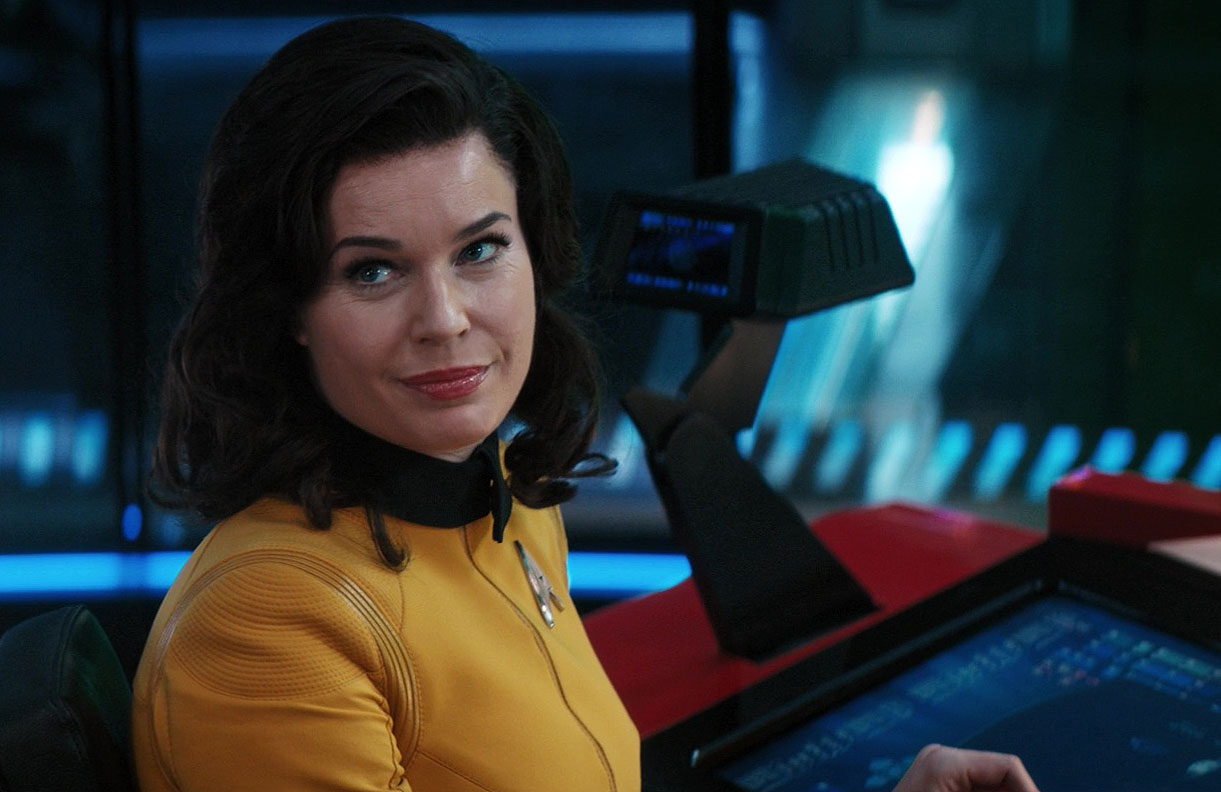
TREKCORE: Rebecca Romijn’s Number One went by ‘Commander’ or simply ‘Number One’ for most of her time on-screen, but it sounded like Pike did call her ‘Una’ one time during the finale — the character’s name from the Star Trek tie-in novels. It wasn’t in the captions, so can you confirm we heard that correctly?
PARADISE: Oh yes, it was Una.
TREKCORE: There was an actor credited as ‘Yeoman Colt’ in Part 1, a character from “The Cage” – the original episode with Captain Pike – but she wasn’t called out by name that we noticed. Was she in a scene that ended up being cut, or…
PARADISE: No, she was one of the Enterprise bridge crew. We had Lt. Mann, Lt. Nicola, Lt. Amin, and Yeoman Colt.
TREKCORE: Was she the alien character with the spiked face? In the original pilot, she was a human…
PARADISE: Yes, I believe that was her. Amin was at the helm, Mann and Nicola was a bit further back, so yes, that would have been Yeoman Colt.

TREKCORE: So, this big time jump. It certainly seems to be the end of an era for Discovery, assuming the trip is as one-way as the crew believed it to be. We see the crew fly off to the far future, but the episode doesn’t follow them through the wormhole, instead sticking around in the ‘present’ to follow those left behind.
PARADISE: We absolutely wanted to wrap up the Discovery storyline for the season, to answer all the questions that were lingering for viewers: the Red Angel and signals, and Burnham and Spock’s relationship. But we also owed answers about canon, and pushing Spock’s character forward to the person he eventually becomes when he meets Captain Kirk.
As we were talking story, it felt that not following the Enterprise to see what happens next would have left way too many open questions, and we really wanted to finish answering those questions that viewers have been asking about: why has Spock never mentioned a sister, why haven’t people heard of Discovery’s spore drive.
All of these things had to be addressed to tie Discovery – the show – back in to canon, and using the last act of the show to do that, and to follow Spock’s journey, felt like the right way to go. It also allowed us to come back and see the Enterprise in all her glory, and reveal Spock [in his classic look]… it’s really the culmination of his story, and Pike’s story, and the Enterprise story.
It felt really important to do that for viewers — and for us.

TREKCORE: Spock suggests to Starfleet that everything about Discovery should get buried, classified, and hidden away to address some of those questions — but will all the time-travel elements that were part of this season, was there ever a thought to “erasing” Discovery from the timeline, or something like that, as an alternate solution?
PARADISE: You know, we talked about what the best way to handle that would be. Time travel is inherently tricky, but to us it felt that the strongest way to go was to make it a conscious choice on behalf of Spock, and Tyler, and Pike. For those to have been there, that they were choosing to keep this secret for the safety of the Federation.
Because if there are still bad elements out there, they don’t want another version of Control coming up and threatening the Federation – so to have them do it as an act of defense, an act of love, and act of courage, no matter how hard it may be…
For Tyler to never talk about Burnham again, for Spock to never talk about his sister, I mean, these are huge emotional sacrifices for these characters — and for Pike, the Discovery crew became family to him — to speak about them as if they’re dead.
Having these characters choosing to hold their secrets felt like the strongest choice, and a choice that comes from love for those people, and for the Federation. Doing anything [with time travel] to make them any less involved in that decision would have felt like we weren’t doing those characters justice.
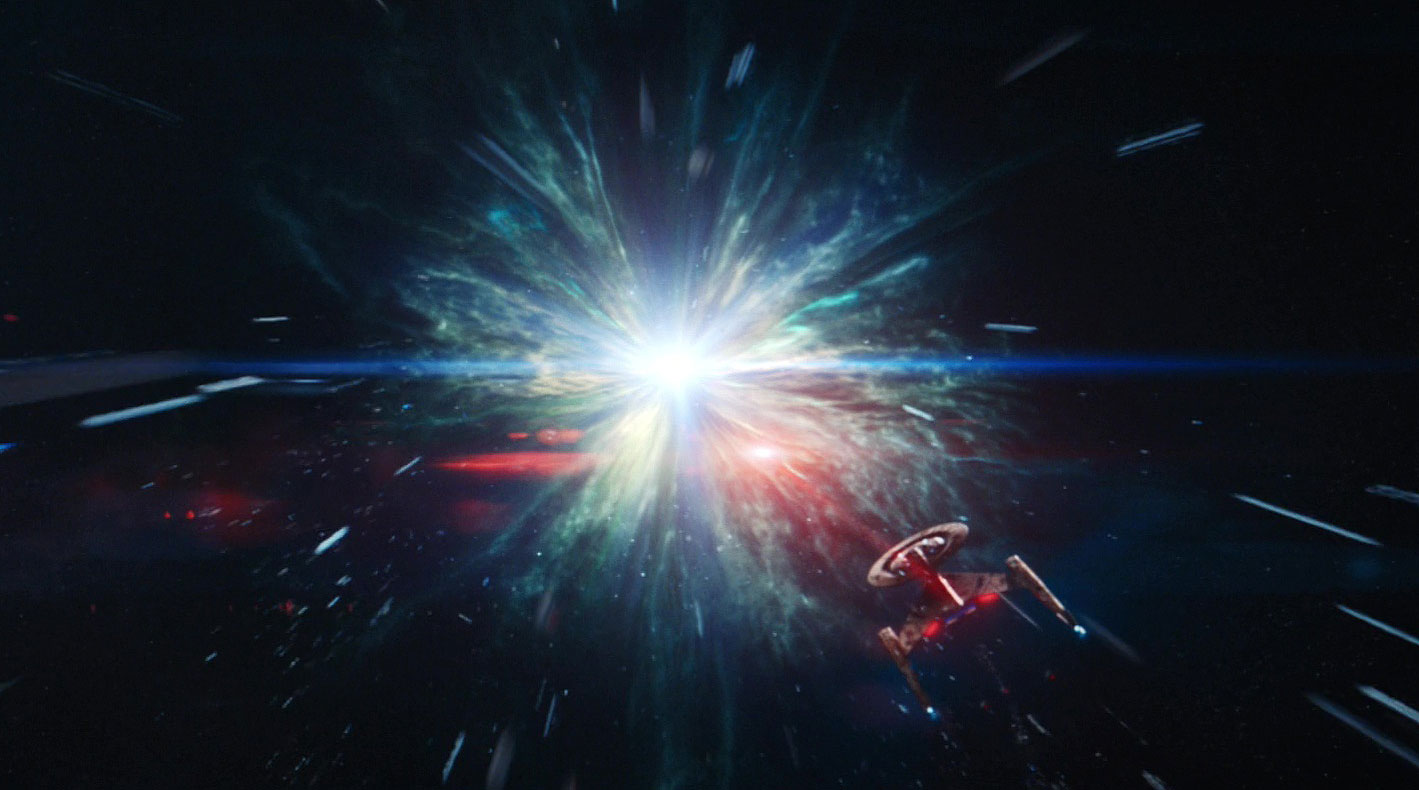
TREKCORE: I know Discovery as a show isn’t going anywhere; you’re already hard at work on Season 3 in the writers room. How are thing going so far, as you’re getting into the next chapter of the Discovery story?
PARADISE: We are in great shape, and we have a very good sense of things, and where we’re headed. I obviously can’t say anything specifically… except about the musical episode where everyone puts on roller skates. [Laughs] That one’s not ever going to happen on the show, just to be clear!
But we’re in really good shape. We have an incredible team of actors and writers; Alex is just an amazing visionary force and we’re really excited about where we’re heading, and to let people see it whenever Season 3 comes out.
![]()
This interview has been condensed and edited for clarity.
